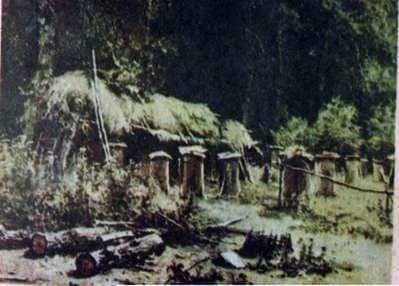
Perhaps all of you love honey. In fact, what could be sweeter than honey! In its fragrant amber drops like infusion of meadow grasses, the smell of July lime groves, the spark of the sun. And in them a huge work of amazing insects – honey bees.
Since ancient times a person has used the gifts of bees, but it took many centuries for him to penetrate into the secrets of these insects.
In the old days bees were mainly engaged in gray-bearded elders. The profession of the beekeeper was covered with all sorts of superstitions and prejudices. Reluctantly let beekeepers to their strangers, concealed from them secrets, although they themselves knew little. Hives did not understand, so it was impossible to look into them and find out what was going on there. Care for the bees was primitive.
Progress in beekeeping began with the appearance of a collapsible frame hive. Such a beehive was invented in 1814 by the outstanding Russian beekeeper PI Prokopovich. Since then, the discoveries have followed one after another, the hives have been perfected, bee relationships in the family have been understood, technical means have been introduced, and more sophisticated techniques for caring for bees have been introduced into practice.
Modern beekeeping is not at all like the old handicraft industry. Powerful farms have 5-10 thousand bee colonies, and they are engaged in the production of honey, wax and bee-pollinating crops. They are equipped with heavy vehicles and tractors and can quickly transfer bees to the honeycombs at any distance.
The apiaries and beekeeping farms of collective and state farms have changed greatly. Many laborious operations in the apiary are now electrified, progressive technology is being introduced. Beekeeping has become an important branch of agriculture.
In large beekeeping farms, only well-trained specialists can work successfully. The modern beekeeper must perfectly know the life of bees, master the art of beekeeping, be able to operate machinery, drive a car and tractor, and understand electrical engineering. He needs to know the honey plants: where and on what soil do they grow? How does it blossom? How much do they release nectar and in what weather? Otherwise, even in favorable years, you can remain without honey. Do not do without him and information about the diseases of bees. As you can see, the beekeeper is a universal specialist. He is a livestock specialist, an agronomist, a mechanic, a technologist, a naturalist, a craftsman, and even a veterinarian.
Such beekeepers of a wide profile are trained by many rural vocational schools located where beekeeping is developed.
Beekeepers can improve their qualifications on improvement courses, receive special education in state farms-technical schools, in agricultural universities.
To study bees means to expand knowledge about nature, to comprehend its laws, evolution.
Communication with bees enriches a person, develops in him observation, accuracy, ingenuity, efficiency.
But working with bees is not easy. We need knowledge, as in any case, labor. Honey is not given for nothing to a bee or a beekeeper. “Keep the bees – not lying in the cold,” – says the Russian proverb. But this work pays off a hundredfold and honey, and harvest.
Our Motherland is rich in honey plants. The possibilities of getting a lot of honey are inexhaustible.
You need many new pollinating apiaries and where large buckwheat, sunflower, coriander, sainfoin, red clover, alfalfa and other melliferous plants are grown in large areas.
The beekeeping industry has a great future. Let also among you there will be more wishing to put on a face net, to kindle a smoke, to open a beehive and to get acquainted more closely with its wonderful inhabitants.
Что пьют пчелы. Что вредно для пчел.
Young Beekeeper